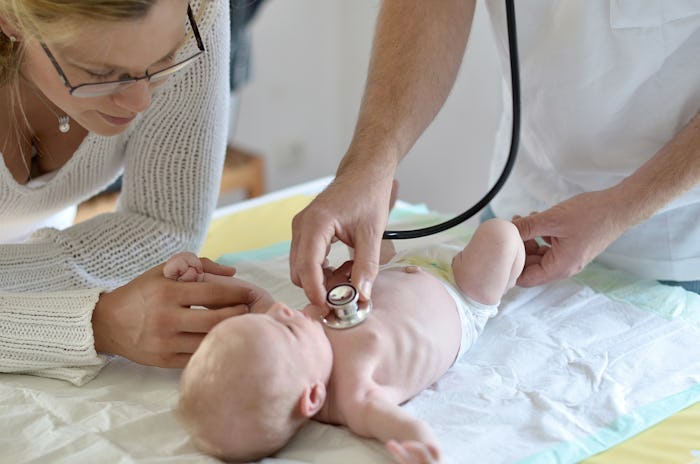Life

11 Things Pediatricians Desperately Want You To Know About Your Baby's 1st Year
When my son was born, I didn't have the slightest clue as to what warranted a call to the pediatrician's office and what was considered to be average crankiness. From developmental milestones, to colic, to teething, so much happens during your baby's first year of life. And if you're a first-time mom, you kind of a clueless as to what it all means. If you're wondering what to expect medically, then you might be interested in the things your pediatrician desperately want you to know about baby's first year.
You might be lucky, and have a baby who doesn't mind going in for wellness check-ups or occasional fevers. But, if your child is anything like mine, they will kick and scream as if someone is trying to break their limbs as soon as you approach the doctor's office. Of course, every baby is different when it comes to temperament, but it turns out quite a few things are universal as far as pediatricians are concerned. So, if you're worried about the parenting roller coaster ride you're about to embark on, you can ease your fears by checking out these things your pediatrician wants you to know about your baby's first year.
1Listen First
"You can’t speak if you can’t hear," pediatrician Dr. Mary Ann LoFrumento tells Romper. "Have a child’s ears tested if there is a speech delay, and a developmental evaluation will help rule out other causes." It's helpful to know that your baby's verbal ability may be affected by their hearing.
2Take Care Of Teeth
"It's important for parents to know that as soon as the teeth start erupting they need to be brushed and cleaned," pediatric dentist Dr. Sandra J. Eleczko tells Romper. "A soft baby toothbrush with a grain of rice-size bit of baby toothpaste is all that is needed." Though it'll take some time until your child has a full set of teeth, it's a good idea to start healthy hygiene habits early.
3Respond Early
"Newborns who are crying should be attended to," LoFrumento says. "They shouldn’t have to soothe themselves to sleep at that age." Though many parents use the Cry It Out method for sleep training, pediatricians don't recommend it for newborns. You'll have plenty of time to work on creating a stable sleep schedule later.
4Watch Their Weight
"Birth weight should double at 5 months and triple by their first year," pediatrician Dr. Preeti Puranik tells Romper. So, instead of worrying whether or not your child is gaining enough weight, you can use this as a guideline. That way, if your baby is significantly far from that mark, you'll know it's with checking in about their growth.
5Prepare For Colds
"Children get seven to eight common viral upper respiratory colds in the first year," pediatrician Dr. Jill Garripoli tells Romper. "They can be sick with a runny nose, cough, and fever on and off for the first year of their lives." As overwhelming as that may seem, it can actually be a relief to know if the frequency of your child's illness falls within the average range.
6Be Patient
"Walking has a large bell curve," LoFrumento tells Romper. "You want to see if they're progressing every month or two with an increase in development toward walking." Some babies walk well before their first birthday while others master their movements much later. As long as they are continuing to advance at their own pace, you shouldn't be too worried about walking.
7Skip The Sweet Stuff
"No honey in the first year," pediatrician Dr. S. Daniel Ganjian tells Romper. "Honey can have botulinum in it which can affect infants greatly, to the point that they need help moving and breathing." Honey may be an all-natural substance, but it's one that your baby needs to be at least 12 months old to consume.
8Be Tolerant Of Tummy Troubles
"All babies in the first 4 months are bound to have gas and some difficulty with pooping here and there," Garripoli says. "Not all stomach issues require medication, but all do require time and patience." Of course, as a parent, you should trust your gut (no pun intended) if you think something is off with your baby's digestive health.
9Slow Down With Solids
"Mixing cereal with formula or breast milk can pose a choking hazard and is more likely to cause inappropriate weight gain," pediatrician Dr. Rekha Sivadasan tells Romper. "Ensure they're able to hold their head up without support, show eagerness to be fed, and can move food from the spoon to the back of the mouth." It's always a good idea to double-check with your child's pediatrician before introducing solid foods into your baby's diet.
10Know What's Normal For Their Nose
"Babies sneeze often when they are born," pediatrician Dr. Alison Mitzner tells Romper. "That is normal and they don’t have a cold." Snorts, sniffles, and sneezes can be disconcerting in babies, but thankfully it's all totally normal. As usual, if you suspect something more serious is going on, check with a medical professional.
11Chill Out
"The biggest thing I wish parents would know is that there is no perfect way to raise a child in the first year," pediatrician Dr. Jasmine Zapata tells Romper. "As long as the kids are fed properly and have a loving and supporting environment, they will be just fine." It's easy to let yourself get caught up in comparisons between you and other parents. But the sooner you let go of expectations for perfection, the more you'll be able to enjoy your baby's first year.